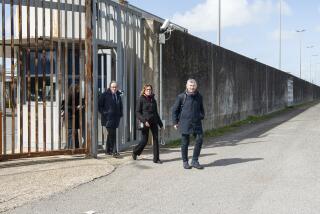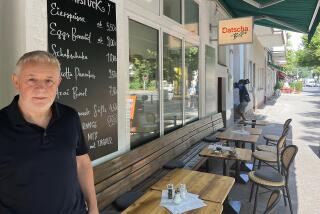For Gypsies, No Place to Call Home : Ethnic tension: The refugees being repatriated from Germany face an unfriendly reception in Romania.
- Share via
BOLINTIN DEAL, Romania — If any of the Romanian Gypsies being expelled from Germany should try to settle in this shabby hamlet, Radu Eugen says, the locals know how to deal with them. Their houses and wagons will be torched and the families hounded out of town.
“We don’t want them to come back here. There has been peace and security since they left last time, and we don’t want any more trouble,” said the 23-year-old carpenter who joined in the sacking and burning of a Gypsy settlement here 18 months ago. “It’s their way to steal and rob people, because they don’t like to work.”
Eugen’s blanket denunciation of Gypsies, who make up as much as 10% of Romania’s population, is hardly surprising in a country where racial and ethnic prejudice have had official encouragement for decades.
What is surprising is that Eugen himself is a Gypsy. He pretends to be Romanian and ingratiates himself with the majority by contributing to the persecution and misery widely suffered by his ethnic brothers.
Many here and throughout Romania fear that a German-Romanian plan to repatriate illegal immigrants is likely to make what is already an unbearable atmosphere even worse.
Under the influence of a $21-million payoff, the Interior Ministry has promised the Bonn government to take in any refugees thought to be Romanian, even those without identity papers, before confirming their citizenship.
More than 40,000 presumed Romanian citizens are already set to be deported. About 70% are Gypsies who face a most unwelcome return.
The Bucharest government’s willingness to accept deportees on speculation that they are Romanians has raised fears among human rights activists that Gypsies from all over Eastern Europe will be targeted, on the basis of their skin color, by German police seeking to oust illegal immigrants.
Gypsy advocates such as Nicolae Gheorghe, who heads Romania’s Roma Democratic Union, worry that a bulk deportation of jobless Gypsies will raise racial tensions that are already at a fever pitch in Romania.
“Those deported from Germany will face discrimination upon their return here, but their situation is not the main problem,” Gheorghe said. “I’m no more impressed by the problems of Gypsies coming from Germany than I am by the tens of thousands here already who have no houses or jobs.”
Of more concern, Gheorghe said, is the potential for abuse of the agreement.
“This seems to be a way for German authorities to get rid of Gypsies in general,” he said. “Romania will accept that they are Romanian Gypsies and not care very much what happens to them once they get here.”
In an effort to frustrate deportation, refugees who are denied asylum in Germany often “lose” their passports and identity cards.
Col. Samoila Joarza, the Interior Ministry officer in charge of immigration and repatriation, insists that only those whose Romanian citizenship can be verified will be permanently accepted under the deportation agreement.
The ministry is still working out details of the expulsion with German authorities, he said, but he predicted that some of the 40,000 already denied asylum in Germany will begin returning as soon as the agreement takes effect Nov. 1.
German Interior Minister Rudolf Seiters has estimated that 100,000 Romanians are living illegally in Germany, foreshadowing a larger and potentially destabilizing repatriation.
Masses of destitute people, many of them Gypsies, have fled the impoverished and volatile Balkan peninsula since anti-Communist revolutions lifted barriers against travel and set in motion chaotic and painful transitions to capitalist economies. Many who apply for asylum in Central or Western Europe are rejected because they are considered “economic refugees” rather than victims of political repression.
The German Interior Ministry announced a day after the Sept. 24 signing of the Romanian repatriation accord that it was negotiating similar agreements with Czechoslovakia and Bulgaria. Most applicants from those countries are eventually denied political asylum.
But Bonn’s plan to deport the Romanians has struck a nerve with human rights organizations because most of those involved are Gypsies--a race that was persecuted by Nazi Germany during World War II. As many as 500,000 Gypsies are thought to have been killed in Adolf Hitler’s concentration camps and gas chambers.
Unabashed hatred of Gypsies is pervasive in Romania, where even intellectuals and government officials show little compassion for Europe’s most repressed minority.
“They shouldn’t come back here; they should be isolated somewhere where they can live alone--not in Romania, somewhere far away, like in a desert!” declared Ioana Mihai, a 50-year-old railroad worker in the southern city of Giurgiu, upon hearing of the repatriation plan. “They’re all criminals. It’s genetic.”
Deputy Labor and Social Protection Minister Constantin Alecu, the official responsible for distribution of the re-integration assistance from Bonn, refused to discuss how the money would be spent.
“They left for Germany without any help from us, and they can come back the same way,” he said when asked if the funds would be used to resettle the refugees.
If money is set aside for job training, it would not necessarily benefit those returning, Alecu said, “because most of them are Gypsies, and they don’t really want to work.”
Contempt for Gypsies has escalated since the fall of communism in Eastern Europe, where nomadic clans were forcibly settled in farming and industrial communities but were never accepted by the local populations.
In Romania, the late dictator Nicolae Ceausescu portrayed Gypsies as subhuman parasites, officially sanctioning discrimination against the country’s largest minority. Forced into menial jobs and the most dilapidated of housing, few were assimilated into the Romanian communities to which they were banished.
The Ceausescu regime’s forced settlement of nomadic Gypsies in various towns and cities in the 1950s and ‘60s served to elevate the status of more settled Gypsies, establishing a kind of pecking order. Bricklayers and carpenters, such as Eugen, tend to be accepted if they are natives of a community, while clans that traveled suffered the harshest discrimination.
The worst violence between Romanians and Gypsies in many years erupted here in April, 1991, when a drunk Gypsy stabbed a Romanian in a bar fight. The village’s 5,000 Romanians , summoned by an alarm bell, embarked on a rampage that left the Gypsy settlement in ashes.
Many residents of Bolintin Deal, Gypsies and Romanians alike, assume that the Gypsies who left for Germany were troublemakers of the type they kicked out then.
More to Read
Sign up for Essential California
The most important California stories and recommendations in your inbox every morning.
You may occasionally receive promotional content from the Los Angeles Times.














